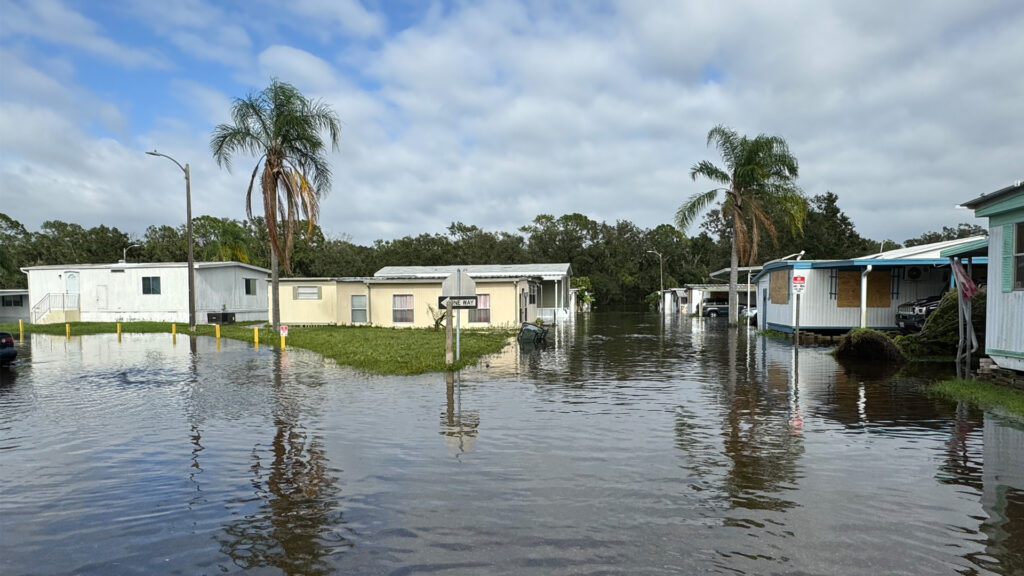By Rachel Rhode, Environmental Defense Fund
This year’s hurricane season brought unprecedented challenges for the southeastern U.S., especially in Florida where three hurricanes made landfall in just two months. First Debby came, then Helene and finally Milton – costing billions of dollars in damage and devastating numerous communities and families across the state.
These devastating disasters underscore the need and urgency to build resilience and ensure preparedness ahead of future storms. Florida leaders have made great progress this year to better protect residents, but there is still a lot of work to be done. Let’s look back at Florida’s 2024 progress and consider new initiatives to prepare for the next storm.
How leaders have built resilience this year

This year, Florida leaders have taken important steps forward in building resilience for its communities.
One big win came in May, when lawmakers passed a mandatory flood disclosure bill into law that provides more transparency to homebuyers. This new law, which went into effect in October, now requires sellers to provide potential buyers with insurance claims related to flood damage and disclose if federal assistance was given due to flooding.
Having this information allows buyers to better understand their flood risks before purchasing a home and make informed decisions, whether that be getting flood insurance, prioritizing home repairs, retrofitting or buying elsewhere.
Additionally, the Resilient Florida program, which awards grants to communities working to enhance coastal and inland resilience, received additional funding this year. Funds from this program are helping places like Punta Gorda enhance its waterfront with natural infrastructure that creates habitat and protective storm buffers, as well as Pinellas County in implementing a living shoreline project that mitigates sea level rise, improves water quality, reduces erosion and creates habitat.
Since the program’s creation three years ago, Resilient Florida has invested more than $1.4 billion in innovative flood projects and planning efforts across the state.
Ways to continue supporting communities ahead of future storms
In the upcoming year, lawmakers and leaders have an opportunity to continue supporting important resilience-building efforts and preparedness.

For instance, Resilient Florida is up for renewal in 2025 and, if renewed, can make an even bigger impact with increased funding allocation, technical support and staff capacity. With so many key projects in need of investment, greater annual funding for the program could support the top 20-25% of projects that apply. Additional funding is also needed to support technical assistance and capacity needs within the program.
Furthermore, Florida’s Department of Environmental Protection has an opportunity to conduct a statewide feasibility study to seek nature-based and hybrid solutions that address increasing flood risks, support risk reduction and fight rising insurance costs.
In a recent Environmental Defense Fund survey of experts statewide, over one-third of participants chose the lack of design guidelines for nature-based solutions in Florida as one of the top barriers to implementation. A statewide feasibility study could help establish design guidelines and recommendations to streamline the permitting process and promote effective nature-based solutions throughout the state.
It’s been a particularly difficult hurricane season in Florida, but increasing resilience efforts will prove significant as we prepare for future storms. EDF thanks lawmakers for the progress made in 2024 and looks forward to collaborating on continued resilience-building efforts in the upcoming year.
Rachel Rhode is a manager for the Environmental Defense Fund’s Climate Resilient Coasts and Watersheds program in Florida. Banner image: Hurricane Milton is pictured in the Gulf of Mexico from the International Space Station as it orbited 257 miles above. (NASA/Michael Barratt, Public domain, via Wikimedia Commons). This piece was originally published at: https://blogs.edf.org/growingreturns/2024/12/04/how-florida-built-resilience-this-hurricane-season-and-what-can-be-done-to-prepare-for-future-storms/.
Sign up for The Invading Sea newsletter by visiting here. To support The Invading Sea, click here to make a donation. If you are interested in submitting an opinion piece to The Invading Sea, email Editor Nathan Crabbe at nc*****@*au.edu.



